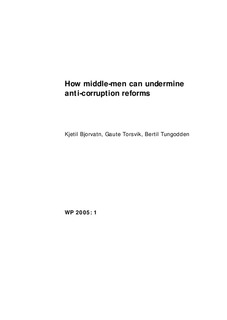How middle-men can undermine anti-corruption reforms
| dc.contributor.author | Bjorvatn, Kjetil | |
| dc.contributor.author | Torsvik, Gaute | |
| dc.contributor.author | Tungodden, Bertil | |
| dc.date.accessioned | 2008-02-20T09:42:34Z | |
| dc.date.accessioned | 2017-03-29T09:12:57Z | |
| dc.date.available | 2008-02-20T09:42:34Z | |
| dc.date.available | 2017-03-29T09:12:57Z | |
| dc.date.issued | 2005 | |
| dc.identifier.isbn | 82-8062-103-2 | |
| dc.identifier.issn | 0804-3639 | |
| dc.identifier.uri | http://hdl.handle.net/11250/2435982 | |
| dc.description.abstract | The anti-corruption reform in the Tanzanian tax bureaucracy in the mid-1990s was apparently a short-lived success. In the wake of the reform, a number of “tax experts” established themselves in the market, many of them being laid off tax bureaucrats. We argue that middle -men can undermine the effect of an anti-corruption reform by reducing the uncertainty that firms face vis -à-vis a reformed tax bureaucracy, which in turn may encourage firms to pay bribes rather than taxes. Indeed, under some circumstances, middle-men can cause corruption to be higher after the reform than before the reform. Since the demand for middle –men may increase with the extent of the reform, we also demonstrate that a small reform may be more efficient in combatting corruption than a more radical reform. | |
| dc.language.iso | eng | |
| dc.publisher | Chr. Michelsen Institute | |
| dc.relation.ispartofseries | CMI Working paper | |
| dc.relation.ispartofseries | WP 2005: 1 | |
| dc.subject | Corruption | |
| dc.subject | Reform | |
| dc.subject | Middle-men | |
| dc.subject | Institutions | |
| dc.subject | Tanzania | |
| dc.title | How middle-men can undermine anti-corruption reforms | |
| dc.type | Working paper |
Files in this item
This item appears in the following Collection(s)
-
Bora-import [434]
